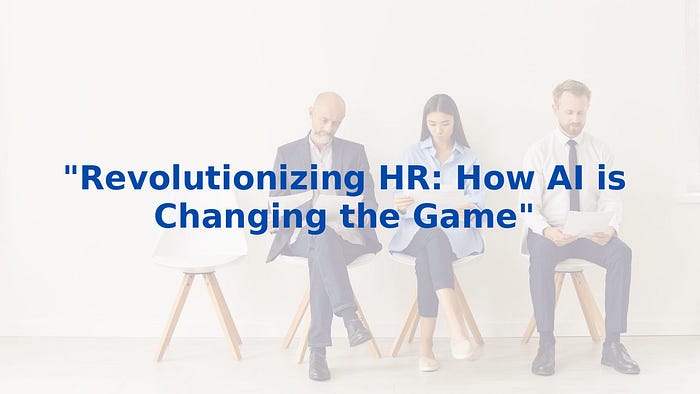9 Groundbreaking Changes AI Is Bringing to Human Resources
Artificial Intelligence (AI) has grown exponentially, transforming the way we conduct business. Software and computer programs that can ‘think’ are no longer science fiction but an integral part of our reality, interacting with their environment and reacting accordingly.
The Essence of Artificial Intelligence
AI is essentially the ability of machines to perform cognitive tasks that require human intelligence, such as learning, decision-making, visual perception, and speech recognition. In simple terms, it’s intelligence demonstrated by machines, enabling them to mimic cognitive processes and even learn on their own.
The Upsides of AI in Human Resources
In today’s world, AI is indispensable across various industries, simplifying laborious tasks with unprecedented accuracy. Companies are now investing in AI for HR due to its numerous benefits, including increased revenue generation, better efficiency, accuracy, time-saving, enhanced creativity, and reduced stress for HR professionals.
In the era of Big Data, AI’s importance is magnified. Data analysis in HR can be time-consuming, but AI software’s ability to recognize patterns in data makes the process faster and more accurate. AI can highlight crucial information, identify mistakes, and provide consistency faster than any human could.
Nine Ways AI is Revolutionizing HR
The question isn’t whether to adopt AI but when. AI is automating and streamlining workflow in HR in the following ways:
1. Candidate Sourcing
AI platforms dominate the candidate sourcing arena, consistently identifying the best talent in vast pools of data. Smart recruitment processes have made manual sourcing obsolete. Examples of AI-backed platforms include Arya, Engage Talent, and Entelo, which:
- Source talents from internal and external databases
- Predict whether a candidate will accept a job offer
- Identify qualified candidates
- Select candidates most open to new opportunities
2. Resume Screening
While not complicated, resume screening is laborious. AI can completely automate this process, saving time and ensuring comprehensive database searches for potential candidates who fit new job openings.
3. Reducing Bias
Recruiters, being human, may have biases that affect their decisions. AI uses algorithm assessment platforms to eliminate such biases, ensuring a diversified candidate pool. These platforms can be reprogrammed to eliminate biases if detected, something not easily achievable with human intervention.
4. Streamlining Onboarding
AI tools streamline the onboarding and training process. New employees require significant HR attention, which can be minimized with AI programs. AI algorithms design ideal training processes based on new employees’ skills and expertise. Intelligent bots assist by answering routine policy or insurance questions, freeing up HR teams to focus on more crucial tasks.
5. Improved Training
AI tools identify skill gaps and create tailored training programs, offering a more targeted learning experience. Regular AI analytics assist HR professionals in determining the best strategies moving forward, such as identifying potential bottlenecks or redefining job descriptions.
6. AI Personal Assistants
AI personal assistants like Siri and Google Assistant excel in individual tasks, but HR-specific AI assistants, such as Amy Ingram and Leena AI, are tailored for organizational tasks. They handle scheduling, reminders, meeting management, and even personalized email writing.
7. Administrative Task Automation
Repetitive tasks in HR, such as payroll management, compliance, and document submissions, can be automated with AI, freeing up time for HR professionals to focus on strategic tasks. AI systems ensure perfect accuracy in these tasks, something vital for tasks like payroll.
8. Enhancing Retention
AI systems can redirect employees to development opportunities or other roles within the organization, improving job satisfaction and retention rates. AI can also detect when employees might be planning to leave by analyzing changes in their digital behavior.
9. Calendar and Schedule Maintenance
Maintaining schedules can be tedious, but AI systems can organize personal calendars and remind employees of upcoming duties and meetings, allowing them to concentrate on their core responsibilities.
Conclusion
While HR departments may be slow to adopt disruptive technology, AI is transforming human resources. HR professionals must embrace AI-based solutions, enhancing productivity and allowing HR professionals to become better consultants. By automating repetitive tasks, AI enables HR to focus on strategic decision-making, talent cultivation, and management.
Though AI is crucial, the human element in HR will always remain essential, ensuring a balanced and effective work environment.
Master AI in Your Profession: The Ultimate Training Experience
You’re about to become an AI expert in your profession. Dive into the most complete AI training programs crafted for 220+ professions. Kickstart your journey to AI mastery and future-proof your skills, save a wealth of time, secure your job, and maximize your income. Get unlimited access to all video courses, AI certifications, AI tools, custom GPTs, thousands of job prompts, AI eBooks & guides, AI audiobooks, and more. Become an AI expert today. Explore continuously updated AI courses tailored for your job. Check out the comprehensive offerings at Complete AI Training , view the full course list at Courses A-Z , learn about our AI certifications at AI Certification , and sign up for unlimited access at Complete AI Training Portal .


